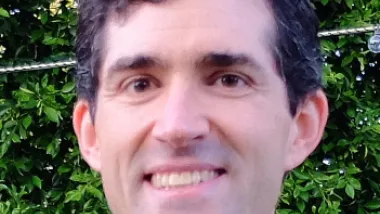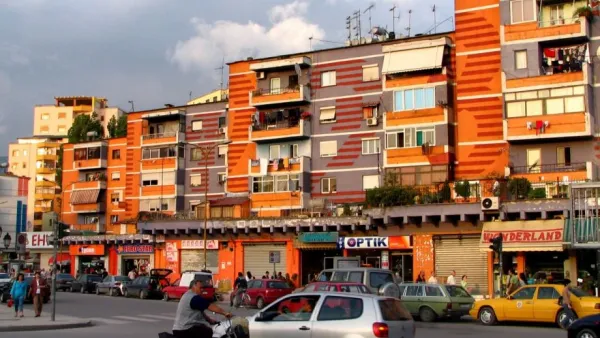Here's an item that should be more than enough to make you spew your morning latte all over the Starbucks: In a survey, conducted last year and released yesterday by Mercer Consulting, ranking the top 50 global cities by quality of life, not a single American city cracks the top half. Zero.
Here's an item that should be more than enough to make you spew your morning latte all over the Starbucks:
In a survey, conducted last year and released yesterday by Mercer Consulting, ranking the top 50 global cities by quality of life, not a single American city cracks the top half. Zero.
The list, which looks a lot like the medal count in the Winter Olympics, bespeaks disparities that are obvious to anyone who thinks a city should be more than a series of off-ramps. Granted, Western Europe has a tradition of gracious living going back many centuries, and of course Canada, Australia, and New Zealand are apparantly just better than us. But, even so, no developed nation has a more vast array of large cities than the United States. Dumb luck alone should be enough to vault one of them into a respectable position. But it turns out that we've made the same mistakes over and over again, from sea to shining sea. (The forces of dreck apparently can't swim; Honolulu is our beacon of gentility at No. 27. Then again, if you ask the pro surf tour, Hawai'i isn't even part of the United States.)
Many Americans rightfully take pride in so-called gems like San Francisco, New York, Portland, and even Los Angeles on a clear day. But Mercer's analysis indicates that we're fooling ourselves: we're so far from the top that, in true Platonic fashion, we can't even imagine what the top looks like. We revel in mediocrity without bothering to find out what constitutes good.
You could quibble with the methodology or the criteria, which include trifles like crime, sanitation, education, housing, and transportation. But then again, you can't. Not when, with all respect and sympathy to Baku, you're not even close. Not when you're as wealthy and powerful as the United States is. The county with one-fourth of the world's GDP--not to mention a mythical culture of ingenuity--should be able to figure out some way to rise to rise to the level of Switzerland, Canada, and Germany.
Cities that we bombed 60 years ago now gleam while the second-richest city in the world -- New York -- is used as the baseline for indexing the top 50; its normalized score of 100 puts it at 48th. How bankers, lawyers, and captains of industry can figure out how to move tens of billions of dollars per day yet not bother to clean the very streets that they walk or properly house the poor in the outlying boroughs is beyond me. I suppose they are so busy making money that they don't bother to think about how to spend it.
Fortunately, a good handful of places that Republicans love to hate populate the bottom half of the top 50--San Francisco, Boston, Portland, etc. But no one should consider that good enough. If so many American cities are that close, at least one of them should figure out how to vault into the upper tiers. And then the rest should learn to follow.
Yes, American cities face challenges that many foreign cities do not. They are heterogeneous stews of all manner of cultures, economies, ethnicities, and all the rest, and they weren't around to become quaint when cobblestones and crooked alleys were in vogue. They also don't suffer the burden of complacent populations and asinine government policies. And Toronto, Sydney, and Vancouver prove that you don't need history to create a nice city; you just need people--be they public officials, pillars of the community, indiginous businesses, or everday residents--who care.
And the excuses only highlight our failure to find strength in diversity and to reinvent cities in truly modern ways, rather than destroy them through sprawl, neglect, and fear of the other. It would be one thing if we were gaining something in exchange for lower quality of life--maybe great public education or civic arts or all-night salsa dancing or exchanging ideas so furiously that we can't pay attention to other trivialities-- but I think we're more likely watching American Idol in the suburbs or edging past crack dealers in forgotten neighborhoods.
Finally, this isn't about competition. I don't care about not "winning" the quality of life poll any more than I care about not winning in the two-man bobsled. But I do care that hundreds of millions of Americans live, grow up, and toil in places that are less clean, less safe, less pleasant, less sociable, and less inspiring than counterparts around the globe.

Analysis: Cybertruck Fatality Rate Far Exceeds That of Ford Pinto
The Tesla Cybertruck was recalled seven times last year.

National Parks Layoffs Will Cause Communities to Lose Billions
Thousands of essential park workers were laid off this week, just before the busy spring break season.

Retro-silient?: America’s First “Eco-burb,” The Woodlands Turns 50
A master-planned community north of Houston offers lessons on green infrastructure and resilient design, but falls short of its founder’s lofty affordability and walkability goals.

Test News Post 1
This is a summary

Analysis: Cybertruck Fatality Rate Far Exceeds That of Ford Pinto
The Tesla Cybertruck was recalled seven times last year.

Test News Headline 46
Test for the image on the front page.
Urban Design for Planners 1: Software Tools
This six-course series explores essential urban design concepts using open source software and equips planners with the tools they need to participate fully in the urban design process.
Planning for Universal Design
Learn the tools for implementing Universal Design in planning regulations.
EMC Planning Group, Inc.
Planetizen
Planetizen
Mpact (formerly Rail~Volution)
Great Falls Development Authority, Inc.
HUDs Office of Policy Development and Research
NYU Wagner Graduate School of Public Service




























